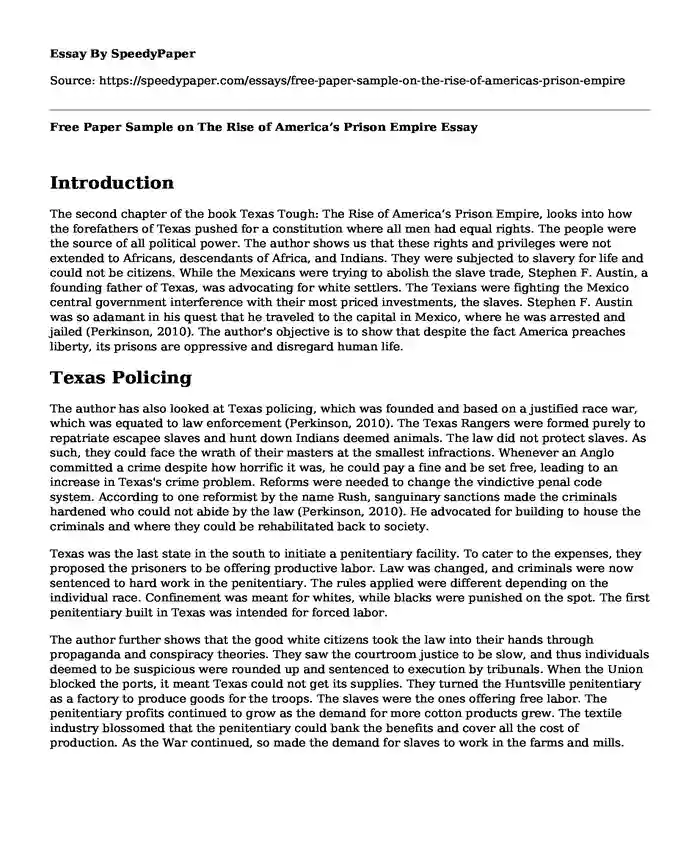
| Type of paper: | Essay |
| Categories: | Racism Policy United States Penal system |
| Pages: | 3 |
| Wordcount: | 655 words |
Introduction
The second chapter of the book Texas Tough: The Rise of America’s Prison Empire, looks into how the forefathers of Texas pushed for a constitution where all men had equal rights. The people were the source of all political power. The author shows us that these rights and privileges were not extended to Africans, descendants of Africa, and Indians. They were subjected to slavery for life and could not be citizens. While the Mexicans were trying to abolish the slave trade, Stephen F. Austin, a founding father of Texas, was advocating for white settlers. The Texians were fighting the Mexico central government interference with their most priced investments, the slaves. Stephen F. Austin was so adamant in his quest that he traveled to the capital in Mexico, where he was arrested and jailed (Perkinson, 2010). The author's objective is to show that despite the fact America preaches liberty, its prisons are oppressive and disregard human life.
Texas Policing
The author has also looked at Texas policing, which was founded and based on a justified race war, which was equated to law enforcement (Perkinson, 2010). The Texas Rangers were formed purely to repatriate escapee slaves and hunt down Indians deemed animals. The law did not protect slaves. As such, they could face the wrath of their masters at the smallest infractions. Whenever an Anglo committed a crime despite how horrific it was, he could pay a fine and be set free, leading to an increase in Texas's crime problem. Reforms were needed to change the vindictive penal code system. According to one reformist by the name Rush, sanguinary sanctions made the criminals hardened who could not abide by the law (Perkinson, 2010). He advocated for building to house the criminals and where they could be rehabilitated back to society.
Texas was the last state in the south to initiate a penitentiary facility. To cater to the expenses, they proposed the prisoners to be offering productive labor. Law was changed, and criminals were now sentenced to hard work in the penitentiary. The rules applied were different depending on the individual race. Confinement was meant for whites, while blacks were punished on the spot. The first penitentiary built in Texas was intended for forced labor.
The author further shows that the good white citizens took the law into their hands through propaganda and conspiracy theories. They saw the courtroom justice to be slow, and thus individuals deemed to be suspicious were rounded up and sentenced to execution by tribunals. When the Union blocked the ports, it meant Texas could not get its supplies. They turned the Huntsville penitentiary as a factory to produce goods for the troops. The slaves were the ones offering free labor. The penitentiary profits continued to grow as the demand for more cotton products grew. The textile industry blossomed that the penitentiary could bank the benefits and cover all the cost of production. As the War continued, so made the demand for slaves to work in the farms and mills.
Conclusion
The author ends the chapter by highlighting the problem the Texas legal system faced after the American Civil War. There were almost 250,000 men, women, and children who used to be slaves but are now citizens who do not own property and did not have means of fending for themselves. The crime was going to rise, but how will the court judge these individuals who were are now independent. They were used to private discipline but will now be subjected to public regulation. Another effect of the War was the thousands of veterans who came home after losing the War. They had nothing to come for back home, armed and used to violence. They broke the law by engaging in theft, murder robbery, and other deviant behaviors. Texas was not well equipped to address the aftermath of the War.
Reference
Perkinson, R. (2010). Texas tough: The Rise of America’s Prison Empire. Holt.
Cite this page
Free Paper Sample on The Rise of America's Prison Empire. (2023, Nov 10). Retrieved from https://speedypaper.net/essays/free-paper-sample-on-the-rise-of-americas-prison-empire
Request Removal
If you are the original author of this essay and no longer wish to have it published on the SpeedyPaper website, please click below to request its removal:
- Essay Sample on San Francisco Homeless Problem
- Essay Sample about Therapeutic Interventions for Sexually Abused Girls
- Essay Example Dedicated to U.S. Imperialism
- Essay Sample on The Fresno County Sherriff's Office
- Essay Sample on Criminal Justice Theories Crime and Deviance
- The Secret Terrorism Trial Bill: Sixth Amendment Implications - Free Essay Example
- Essay Sample on Healthcare Perspectives: Contrasting Japanese and American Systems
Popular categories




